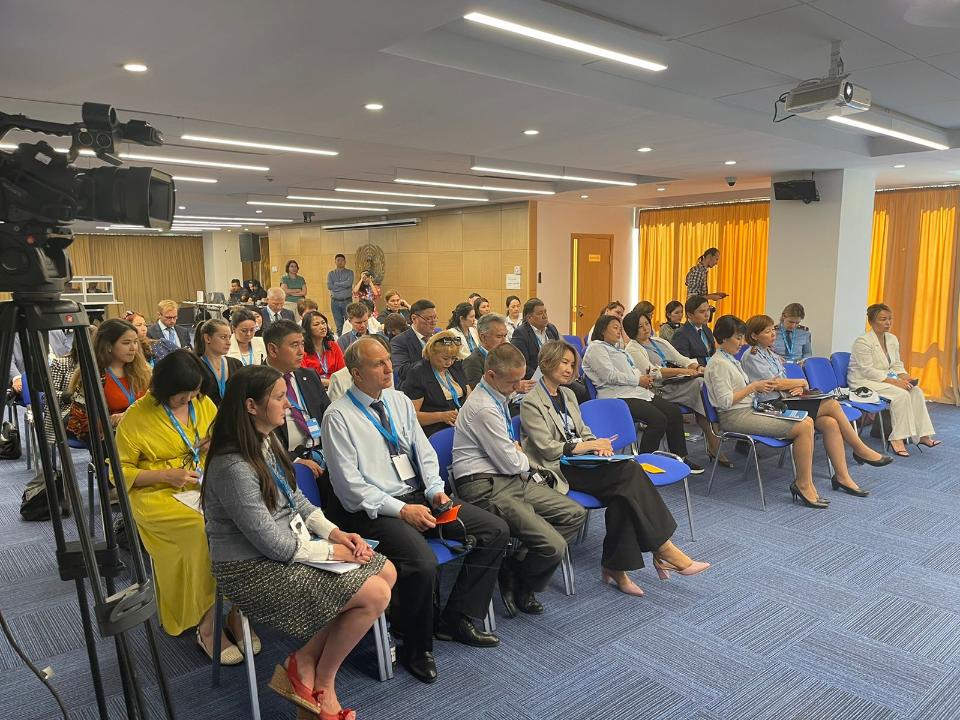NUR-SULTAN – Some 1,273 children have received birth certificates and have been able to access educational and social services as part of the Protection of Children in Migration Processes project implemented by the European Union (EU) and the United Nations Children’s Fund (UNICEF) Office in partnership with Commissioner for Human Rights in Kazakhstan and the Committee for the Protection of Child Rights.

In November 2019, Kazakhstan has amended its Code of Marriage and Family to ensure that all children born in the country are registered at birth and receive birth certificates, regardless of the legal status of their parents. Photo credit: UNICEF/2018/Valera Kaliev
The results of the four-year multi-country program designed to ensure effective support and protection of child rights in migration processes were presented on May 27 in Almaty.
“The most important result of the full four years of work was the development of a legal framework for registration of children born to mothers who do not have documents. Over the past three years, 1,500 children born in medical institutions received birth documents. This means that they will be able to attend kindergarten, school, get a certificate of secondary education, as well as have access to medical care and necessary social services. These children will not become ‘invisible’,” said Arthur van Diesen, UNICEF Representative in Kazakhstan.

The participants of the conference in Almaty. Photo credit: Human Rights Commissioner website
According to official data, more than 2.035 million entered Kazakhstan in 2021, compared to 6 million in 2020. Most vulnerable in this migration process are children.
The UN data indicates that as of 2019, 432,420 children born outside the country lived in Kazakhstan. Some of them do not have birth documents, which deprives them of access to education and social services, particularly common among preschool children.
“Paperwork challenges are one of the most frequently encountered by migrants and their families. They lead to serious consequences for children: from the risk of being separated from their parents to criminal and administrative liability based on their migration status,” said Arthur van Diesen.
The program trained the specialists working with children in migration, addressed complex cases of children in migration processes that required the involvement of representatives from different departments and saw the opening of child-friendly rooms for children in migration in Nur-Sultan and Almaty at the premises of child support and adaptation centers.
The program will send their recommendations to the government, including ensuring that all children, regardless of their nationality, citizenship, migration status, and residence status or lack thereof, have access to early development services, education, health care, social protection on an equal basis with children who are citizens of Kazakhstan, spread the practice of providing protective services to children in migration processes based on the model tested with the support of UNICEF in Nur-Sultan, Almaty, Shymkent and Turkistan, consider the possibility of introducing a ban on the placement of children in closed institutions, and child support centers, solely on the basis of their migration status, and consider the inadmissibility of detention and prosecution of children aged 16 and over for violation of migration legislation.
“[as a result of the program], practical assistance was provided to children to ensure their safety and exclusion from victimization. We suggest that the authorized state bodies study the recommendations and take measures to protect children who are in migration processes between regions and entering the country. We express our readiness for further joint work for the benefit of every child in Kazakhstan,” said Kazakhstan’s Human Rights Commissioner Elvira Azimova said.
According to Kestutis Jankauskas, Ambassador of the European Union to Kazakhstan, children in migration processes are doubly vulnerable as children and as migrants.
“They need special attention, protection, and quality services. We are pleased that our partnership with UNICEF, the Commissioner for Human Rights and the Committee for the Protection of Children’s Rights is yielding practical results, and many children in migration processes receive additional protection. We should always do everything possible for children and never compromise in protecting their rights,” he said.
